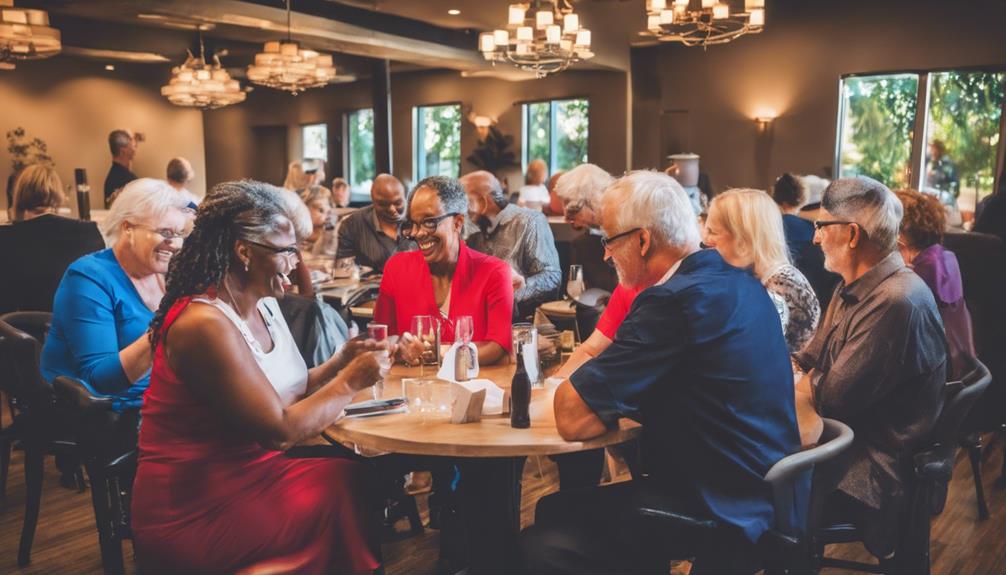Navigating a relationship with someone who is still hung up on their ex can be like walking on a tightrope, trying to balance between empathizing with their feelings and safeguarding your own heart.
It's essential to approach the situation with empathy while also being mindful of your emotional boundaries.
Recognizing the signs of unresolved feelings and knowing how to address them can make all the difference in creating a healthy dynamic.
So, how can we effectively support our partner's healing journey while safeguarding our own well-being in the process?
Key Takeaways
- Recognize signs of emotional baggage and address them sensitively.
- Set clear boundaries and communicate openly about emotional needs.
- Support your partner's healing journey with empathy and understanding.
- Prioritize your emotional well-being by enforcing boundaries and seeking support.
Understanding Your Partner's Emotional Baggage
Understanding our partner's emotional baggage is crucial in navigating a relationship where unresolved feelings from past experiences may influence present dynamics. Recognizing signs of emotional baggage, such as excessive talk about the ex or keeping mementoes, is vital. It's essential to be aware of defensiveness or emotional sensitivity towards the ex as indicators that they mightn't be fully over them. By understanding the impact of unresolved past relationships on current dating dynamics and emotional availability, we can approach the situation with empathy and insight.
Discussing boundaries and communication strategies is key to addressing lingering feelings for the ex in the current relationship. Encouraging open dialogue and supporting your partner's healing process while navigating their emotional baggage can help foster a deeper connection. Remember to approach these conversations with sensitivity and understanding, creating a safe space for both partners to express their thoughts and feelings openly. By working together to navigate these complexities, we can strengthen our bond and overcome any obstacles that may arise.
Setting Clear and Healthy Boundaries

Navigating a relationship with someone who isn't over their ex requires setting clear and healthy boundaries to protect both partners' emotional well-being and foster a strong connection. When dealing with this delicate situation, it's crucial to establish trust and ensure that each person's emotional needs are respected.
Here are some practical steps to help you navigate this challenging terrain:
- Communicate Openly: Clearly express your emotional needs and boundaries regarding their ex to avoid misunderstandings that could lead to unnecessary conflicts or insecurities.
- Limit Ex Discussions: Set boundaries on discussions about the ex to maintain focus on nurturing and developing your own relationship rather than dwelling on the past.
- Establish Consequences: Define consequences for behaviors that indicate your partner isn't over their ex, safeguarding your emotional well-being and signaling the importance of your feelings.
- Prioritize Mental Health: Take care of your mental health by enforcing boundaries on interactions with their ex, creating a secure environment where your relationship can flourish without unnecessary emotional turmoil.
Communicating Effectively and Empathetically
In effective and empathetic communication within a relationship, openly expressing feelings without judgment lays the foundation for a safe and understanding dialogue. It's crucial to listen actively to your partner's concerns and emotions, showing that you genuinely care about their perspective.
Using 'I' statements can help convey your thoughts and emotions without placing blame, fostering a non-defensive environment. Setting boundaries around discussions regarding their ex is essential for maintaining a healthy balance in the relationship.
By practicing empathy and validation, you can demonstrate understanding for your partner's feelings while also advocating for your own needs and boundaries. This balanced approach is key to establishing trust and creating a space where both partners feel heard and respected.
Supporting Your Partner's Healing Journey

To support your partner's healing journey, prioritize open and honest communication to foster understanding and emotional connection. It's crucial to create a safe space where your partner feels comfortable expressing their emotions and working through their healing process together.
Here are some essential ways to support your partner's journey:
- Offer Emotional Support: Be there for your partner, listen actively, and provide reassurance to help them feel secure in the relationship.
- Respect Boundaries: Understand and respect your partner's boundaries, giving them the space they need to navigate their emotions at their own pace.
- Consider Therapy or Counseling: Suggest exploring therapy or counseling options together as a supportive measure to aid in the healing process.
- Focus on Building Trust and Connection: Prioritize building a strong foundation of trust and connection in your relationship to help your partner fully trust and feel supported by you.
Prioritizing Your Own Emotional Well-Being
For safeguarding our emotional well-being in a relationship, it's crucial to prioritize setting clear boundaries and communicating our needs effectively. As relationship experts suggest, establishing these boundaries not only protects our emotional health but also fosters a healthy dynamic with our partner. By openly expressing our needs and desires, we honor our self-respect and create a space for mutual understanding and growth.
In the journey of prioritizing our emotional well-being, self-care plays a pivotal role. It involves recognizing and honoring our own feelings, ensuring that our boundaries are respected. Seeking support from friends, family, or a therapist can also aid in processing our emotions and gaining valuable perspectives. Additionally, engaging in self-reflection allows us to understand our values and needs better, ensuring they align with our relationship dynamics.
Frequently Asked Questions
Should I Date Someone Whos Not Over Their Ex?
We believe it's crucial to consider the emotional toll and complexities involved in dating someone who isn't over their ex. Understanding their emotional availability and commitment is essential before diving into a relationship.
It's vital to assess if you're ready to handle potential challenges and insecurities that may arise. Setting boundaries and open communication are key. Patience, understanding, and support are necessary for navigating their healing process.
Can You Date a Guy Who Isn't Over His Ex?
Absolutely, we've been there, and it's tough. Giving someone space to heal is crucial, but it's also about setting boundaries.
Understanding his emotions and communicating openly can help. It's okay to prioritize your needs too. Tackling this together with honesty and empathy can lead to growth, whether it's moving forward or finding closure.
Is It OK to Date Someone if You're Not Over Your Ex?
It's common to struggle with feelings for an ex while dating someone new. We must prioritize our emotional healing before diving into a new relationship to avoid hurting ourselves and others.
Being honest about our emotions and seeking therapy can help us move forward. Self-care and reflection are crucial for personal growth.
It's okay to date while still dealing with feelings for an ex, as long as we're aware and actively working towards healing.
How Do You Help Someone Who Can't Get Over Their Ex?
Helping someone who can't get over their ex involves listening actively, offering support, and encouraging self-reflection.
We can suggest therapy or counseling, create a safe space for honest conversations, and set healthy boundaries to protect our own well-being.
By being patient and understanding, we show them that they aren't alone in their journey towards healing.
Together, we can navigate through these emotions and work towards building a stronger, more fulfilling relationship.
Can Dating Someone Who Isn’t Over Their Ex Lead to Obsessive Thoughts?
Dating someone who isn’t over their ex can trigger obsessive thoughts. It’s essential to stop obsessing over someone who is still hung up on their past relationship. Emotional baggage can hinder a new relationship’s progress and lead to unwanted fixation on the ex-partner. Communication and closure are key.
Conclusion
In navigating a relationship with someone not over their ex, understanding, setting boundaries, communicating, and supporting are crucial. By prioritizing both partners' healing and emotional well-being, a strong connection can be built.
Remember, love is about growth, not holding onto the past. So, let's continue to navigate this journey together, with empathy, insight, and practicality.
Let's focus on building a future filled with love, understanding, and happiness.









